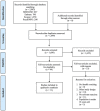Low theoretical fidelity hinders the research on health coaching for opioid reduction: A systematic review of randomized controlled trials
- PMID: 33119705
- PMCID: PMC7595321
- DOI: 10.1371/journal.pone.0241434
Low theoretical fidelity hinders the research on health coaching for opioid reduction: A systematic review of randomized controlled trials
Abstract
Purpose: To systematically review the literature in order to evaluate the effects of health coaching on patients' reduction of opioid usage and opioid discontinuation. In addition, this systematic review investigated the effects of health coaching on pain intensity, physical function, and quality of life.
Methods: Four electronic databases (PubMed, Embase, Scopus, and PsychINFO) were searched from inception to December 2019. Randomized controlled trials assessing the effects of health coaching interventions in adult patients currently using opioids were included. We considered trials if they included any of the four defined key constructs of health coaching adopted in this review: motivational interviewing, positive psychology, the transtheoretical model, and self-determination theory Independent reviewers screened and selected studies, extracted data, and assessed risk of bias using Revised Cochrane risk-of-bias tool for randomized trials (RoB2) and quality of evidence using Grading, Recommendation, Assessment, Development, and Evaluation (GRADE). The review is registered in the International Prospective Register of Systematic Reviews (PROSPERO) databased as CRD42019136201. It was not possible to perform a meta-analysis due to heterogeneity between included trials.
Results: Eleven studies met our inclusion criteria (n = 4,516 participants). No study assessed all four constructs of health coaching. All eleven studies utilized only one of the constructs, brief motivational interviewing. Thus, we reported our results in terms of motivational interviewing. There is conflicting and very low quality of evidence that brief motivational interviewing may or may not be more effective than education to reduce opioid usage. There is very low quality of evidence that brief motivational interviewing is more effective than educational monthly diaries to reduce opioid use. There is very low to low quality of evidence that brief motivational interviewing is not more effective than no behavioral intervention to reduce opioid use at 6 months follow-up, treatment as usual (TAU) to improve overdose risk behaviors, and TAU to improve physical and psychological health.
Conclusion: There is no direct evidence related to the effect of health coaching on opioid reduction. There is limited, low quality evidence to conclude brief motivational interviewing reduces opioid usage in opioid-dependent patients. Future research should focus on the impact of high theoretical health coaching interventions on opioid usage.
Conflict of interest statement
The authors have declared that no competing interests exist.
Figures
References
Publication types
MeSH terms
Substances
LinkOut - more resources
Full Text Sources
Miscellaneous



